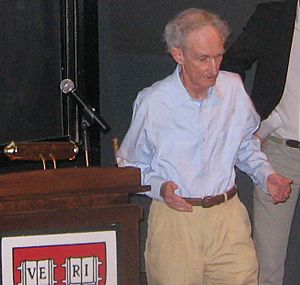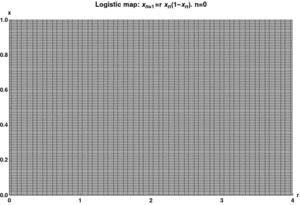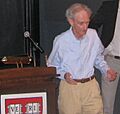Robert May, Baron May of Oxford facts for kids
Quick facts for kids
The Lord May of Oxford
|
|
|---|---|
 |
|
| 59th President of the Royal Society | |
| In office 2000–2005 |
|
| Preceded by | Aaron Klug |
| Succeeded by | Martin Rees |
| Personal details | |
| Born |
Robert McCredie May
8 January 1936 Sydney, New South Wales, Australia |
| Died | 28 April 2020 (aged 84) Oxford, Oxfordshire, England |
| Citizenship | Australia |
| Alma mater | University of Sydney |
| Known for | Logistic map, stability-complexity studies |
| Spouse(s) |
Judith Feiner
(m. 1962) |
| Awards |
|
| Scientific career | |
| Fields | Theoretical ecology |
| Institutions | Imperial College London University of Oxford Harvard University |
| Thesis | Investigations towards an understanding of superconductivity (1959) |
| Doctoral students |
|
| Other notable students | Martin Nowak (postdoc) |
Robert McCredie May, Baron May of Oxford (born January 8, 1936 – died April 28, 2020) was an important Australian scientist. He served as the Chief Scientific Adviser for the UK government. He was also the President of the Royal Society, a famous scientific organization.
May was a professor at several universities, including the University of Sydney and Princeton University. He also held teaching positions at the University of Oxford and Imperial College London. From 2001 to 2017, he was a member of the House of Lords, which is part of the UK Parliament.
Contents
Early Life and Education
Robert May was born in Sydney, Australia, on January 8, 1936. His parents were Henry Wilkinson May and Kathleen Mitchell. They divorced when he was seven years old. His father was from Northern Ireland, and his mother was Scottish.
May attended Sydney Boys High School. After high school, he went to the University of Sydney. There, he studied chemical engineering and theoretical physics. He earned his Bachelor of Science (BSc) degree in 1956. In 1959, he completed his Doctor of Philosophy (PhD) in theoretical physics.
Career and Scientific Discoveries
Understanding Nature with Math

Early in his career, Robert May became very interested in how animal populations change over time. He also studied the connection between how complex a natural community is and how stable it remains. He used advanced math to make big breakthroughs in understanding animal populations.
His work was key to developing a field called theoretical ecology in the 1970s and 1980s. This field uses math to study living things and their environments. He also used his mathematical skills to study diseases and biodiversity, which is the variety of life on Earth.
Teaching and Leadership Roles
From 1959 to 1961, May was a lecturer at Harvard University in the United States. He then returned to the University of Sydney in 1962. He became a professor of theoretical physics there from 1969 to 1972.
From 1973 to 1988, he was a professor at Princeton University. He also led the University Research Board during this time. From 1988 to 1995, he held a special research professorship. This role was shared between Imperial College London and the University of Oxford. At Oxford, he became a fellow of Merton College.
May served as the Chief Scientific Adviser for the UK government from 1995 to 2000. This meant he advised the government on science-related issues. From 2000 to 2005, he was the President of the Royal Society.
Public Contributions and Recognition
Working for the Public Good
Robert May held many important public roles. He was a trustee for the Nuffield Foundation. He also served on the board of the United Kingdom Sports Institute. He was the chairman of the board of trustees for the Natural History Museum. He was also a trustee for the Royal Botanic Gardens, Kew.
He was a member of the Committee on Climate Change. This group advises the UK government on how to tackle climate change.
Views on Climate Change
Even though Robert May was an atheist, he believed that religion could help society deal with climate change. He thought that the way different religions cooperate could be useful in fighting climate change. He strongly felt that religious leaders should do more to encourage people to take action against climate change.
Awards and Special Honors
Robert May received many awards and honors for his scientific work. In 1996, he was made a Knight Bachelor. This meant he could use the title "Sir." In 1998, he became a Companion of the Order of Australia. This is a high honor in his home country.
In 2001, he was made a life peer. This allowed him to become a member of the House of Lords for life. He chose the title Baron May of Oxford. In 2002, he became a member of the Order of Merit. This is a very special award given by the British monarch.
He was elected to the Royal Society in 1979. He also became a member of the American Academy of Arts and Sciences in 1977. He received honorary degrees from many universities around the world. These included Uppsala, Yale, Sydney, and Princeton.
Some of his major awards include:
- The Crafoord Prize in 1996.
- The Balzan Prize in 1998.
- The Copley Medal in 2007, which is the highest award given by the Royal Society.
Personal Life
While studying at Harvard University, Robert May met Judith Feiner. She was from Manhattan. They got married in 1962 and had a daughter named Naomi.
Robert May passed away on April 28, 2020, in Oxford, England. He was 84 years old. He died from pneumonia that was made worse by Alzheimer's disease.
Images for kids
 | Frances Mary Albrier |
 | Whitney Young |
 | Muhammad Ali |



